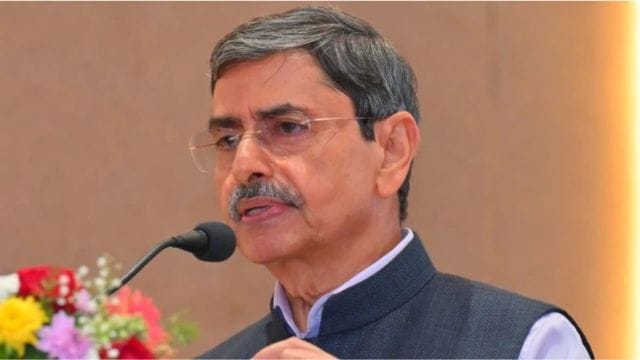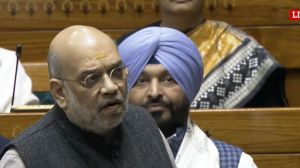Hearing the reference made by President Droupadi Murmu — after a two-Judge bench fixed timelines for the President and Governors to act on Bills sent by State Legislatures — a five-judge Constitution bench of the Supreme Court on Tuesday sought to know “what is the constitutionally permissible recourse for a Constitutional Court” in situations where the Governor keeps Bills pending.
The bench, headed by Chief Justice of India B R Gavai, also asked what was wrong if the President seeks views, through a presidential reference, on whether such timelines can be imposed on Governors and the President.

On April 8, while hearing the case related to pending Bills in Tamil Nadu, the two-Judge bench had set a timeline for Governors to act on pending Bills, and, for the first time, prescribed that the President should take a decision on the Bills reserved for consideration by the Governor within three months from the date on which such reference is received. In a reference to the Supreme Court in May, President Murmu posed 14 crucial questions on the verdict.
Beginning a crucial hearing on the reference on Tuesday, the five-judge bench, which included Justices Surya Kant, Vikram Nath, P S Narasimha and A S Chandurkar, said the ruling may only have been to tackle an “egregious situation” which had arisen, and “not in the form of laying down a precedent.”
Attorney General R Venkataramani argued that Articles 200 and 201, which deal with the powers of the Governor and President to give assent to Bills, are also part of the basic structure of the Constitution and the court’s decision to fix timelines “dilutes” their power to reject a Bill.
“To say the basic structure is only informed by a democratic principle, which is confined to the Legislature, I don’t think that will be a more advisable way of looking at the basic structure doctrine. Articles 200 and 201, I say, are also part of the basic structure where the President and the Governor also play an important functional role in ensuring that if there is no constitutional compliance with the Bill, the President and the Governor will say stop,” he submitted.
“If these are the facts before a constitutional court… and, according to you, the court went wrong… what is the constitutionally permissible recourse for a constitutional court,” Justice Surya Kant asked.
Story continues below this ad
Venkataramani contended that the court cannot set such timelines as it would amount to “taking over the functions of the Governor.” He submitted that prescribing timelines which have not been imposed by the Constitution would amount to a “constitutional amendment”.
“If there is such a set of facts, where the court feels there is no other option, would the court still say I will do what the Governor (has to) do,” Venkataramani said. “The court will probably say the Governor must be asked to find out what is the best course of action which he should follow… Otherwise, you are taking over the functions of the Governor. It can take over in any circumstances in future. No limits can be drawn. No lines can be drawn,” he said.
Justice Kant asked whether it was correct that 2020 Bills were pending.
“Let’s say, even if it is factually correct, so many Bills were sent back,” Venkataramani said. He said he did not want to get into the facts of the case as he had appeared in it.
Story continues below this ad
“It can be seen as an egregious situation which has come to existence. In order to get over that, the court has… it was not in the form of laying down a precedent, but to handle a situation… since it was pending for a long time,” Justice Narasimha said.
Venkataramani, however, said the verdict would act as a precedent and could be applied to matters with similar facts. “The court can say, apply this law, ask the Governor to give deemed assent. The moment the court enters into this arena, you have any number of mind-boggling facts which the court may have to confront. Even if it is so, can this be done,” he asked.
At the outset, the CJI said the bench would first examine objections to the maintainability of the reference under Article 143 of the Constitution. “When the hon’ble President herself is seeking reference, then what is the problem… Are you really serious about contesting this?” the bench asked.
Senior Advocate K K Venugopal, appearing for the Kerala government, said similar questions regarding Article 200 of the Constitution, which requires Governors to act “as soon as possible” on State Bills, had already been interpreted by the top court in cases concerning Punjab, Telangana and Tamil Nadu.
Story continues below this ad
Senior Advocate Abhishek Singhvi, appearing for the Tamil Nadu government, said there cannot be an “intra court appeal directly or indirectly” by filing the reference under Article 143.
“Show us one judgment where in a division bench, a reference is not tenable. We are not deciding the issue whether Tamil Nadu is correct or not,” the CJI said.
Solicitor General Tushar Mehta, appearing for the Centre, said “the highest head of the Executive is seeking the court’s guidance that there are judgments of three judges, two judges, five judges, seven judges and it has created a constitutional functional problem for us.”
Justice Narasimha said the court cannot be expected to resolve the differences between various benches in a reference.
Story continues below this ad
“What would be the contours of Article 200? Am I bound by the three-month deadline? Am I bound to record reasons when the Constitution does not provide? …Is it permissible for the court to say every state must come to court… We will be addressing these on the merits of the case. But there has to be a difference and deference when the court is dealing with constitutional functionaries which is a part of separation of powers,” Mehta said.
Justice Kant said the court was sitting in advisory jurisdiction and would lay down the correct statement of law. He said it will not, however, amount to overruling the judgment.
Mehta said a seven-judge Supreme Court bench had held that the court, under Article 143(1), does have the power to overrule a previous view delivered by it. “View can be overruled, but not a decision,” the CJI said.









